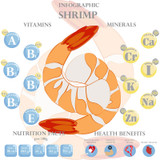
If you’re looking for tasty, high-protein foods that provide a variety of healthy nutrients to your diet, wild-caught Gulf shrimp are the answer. Not only are they appealing to the palate, especially since there are so many ways to prepare them, but they also provide protein, vitamins and minerals. Delicious Gulf shrimp from Biloxi Shrimp Co. can positively improve the healthiness – and taste – of your meals!
Packed with Protein
Gulf shrimp are high in protein and low in carbohydrates. Just 100 grams of cooked shrimp are estimated to provide about 24 grams of protein and only 2/10 of a gram of carbohydrates. If you’ve been eating a paleo-inspired diet that requires foods with more protein and fewer carbs, shrimp may be your new superfood.
Essential Nutrients
These small shellfish don’t stop when it comes to providing nutrients. Incorporating shrimp into your diet provides access to a host of vitamins and minerals, such as:
- Iron
- Iodine
- Calcium
- Magnesium
- Zinc
- Phosphorus
- Niacin
- Vitamin B12
- Selenium
These essential vitamins and minerals may help with thyroid function, brain health and even reduce inflammation. Shrimp also contain omega-6 fatty acids, omega-3 fatty acids and antioxidants that may help reduce cell damage, including harm to the skin from sun exposure. Shrimp are an important source of astaxanthin, an antioxidant that may help strengthen arteries, reducing the risk of heart disease. It also may help increase the HDL cholesterol in your body, which can positively impact cardiovascular health.
Low in Calories
You may have heard that shrimp are low in calories. But do you know just how low? A single shrimp provides only about 7 calories. Other calculations place a 3-ounce serving of shrimp at about 84 calories, or 100 grams of cooked shrimp at about 100 calories. This makes them an excellent choice for anyone who is watching their weight.
This is especially true when compared to other sources of protein, including:
● Beef: 213 calories
● Pork: 206 calories
● Lamb: 160 calories
● Chicken: 138 calories
Of course, the method of preparation affects the final calorie count in your Gulf shrimp dish, but that’s another benefit of serving shrimp – it’s so easy to create delicious shrimp dishes that feature broiled or grilled shrimp. Steamed shrimp are also an excellent accompaniment to your cocktail hour or scattered on your salad at dinner.
No Antibiotics in Wild-Caught Shrimp
If you routinely strive to cook healthy meals and eat foods that provide good nutrition, the use of antibiotics in the food you eat may be of interest. While antibiotics are a vital medicine, their overuse in agriculture can create antibiotic resistance. When antibiotics don't work as well due to this resistance, humans and animals aren't able to use antibiotics to effectively fight infections.
The good news is that wild-caught Gulf shrimp are harvested from nature, meaning there are no antibiotics involved. When you introduce more shrimp into your everyday diet, consider where the shrimp come from, and make sure you purchase wild-caught shrimp from the United States.
Ample Antioxidants
Unstable molecules called free radicals are all around us, from the sun’s rays and environmental pollutants to inside our bodies as food is transformed into energy. These molecules cause a process called oxidative stress that damages our cells and increases the risk for many serious conditions, including cognitive decline, heart disease, cancer, Parkinson’s disease and more. Fortunately, a diet rich in antioxidants can help reverse the impact of free radicals and keep cells healthy.
Antioxidants are found in many foods, including fruit, vegetables, nuts, leafy greens, dark chocolate and, of course, wild-caught Gulf shrimp. These antioxidants can help prevent inflammation, strengthen the arterial walls and even improve HDL cholesterol levels.
What About Cholesterol?
For a long time, shrimp’s high cholesterol content raised questions about its health benefits. Just three ounces provides 166 mg, far more than other seafood and more than half of the 300 mg daily limit for healthy adults. It was once believed that dietary cholesterol from shrimp and other foods contributed to high blood cholesterol levels. When blood cholesterol is too high, fatty deposits clog blood vessels and leave us vulnerable to strokes, heart attacks and more.
However, healthcare experts’ understanding of dietary cholesterol has evolved. Today, we know that dietary cholesterol has little, if any, impact on blood cholesterol, which is produced by the liver. Shrimp have also been shown to help lower triglycerides and raise HDL, or “good,” cholesterol. In the end, there is no reason to exclude Gulf shrimp from a healthy diet, if anything, we encourage them!
Eat Gulf Shrimp and Improve Your Health
Gulf shrimp help lower your risk for disease and promote healthier living. To learn more about the benefits of eating Gulf shrimp, contact Biloxi Shrimp Co. in Biloxi, Mississippi, today. Need ideas for cooking with shrimp? Visit our recipes and blog for inspiration.
Click here to order mouthwatering wild-caught shrimp straight from the warm waters of the Gulf of Mexico.
